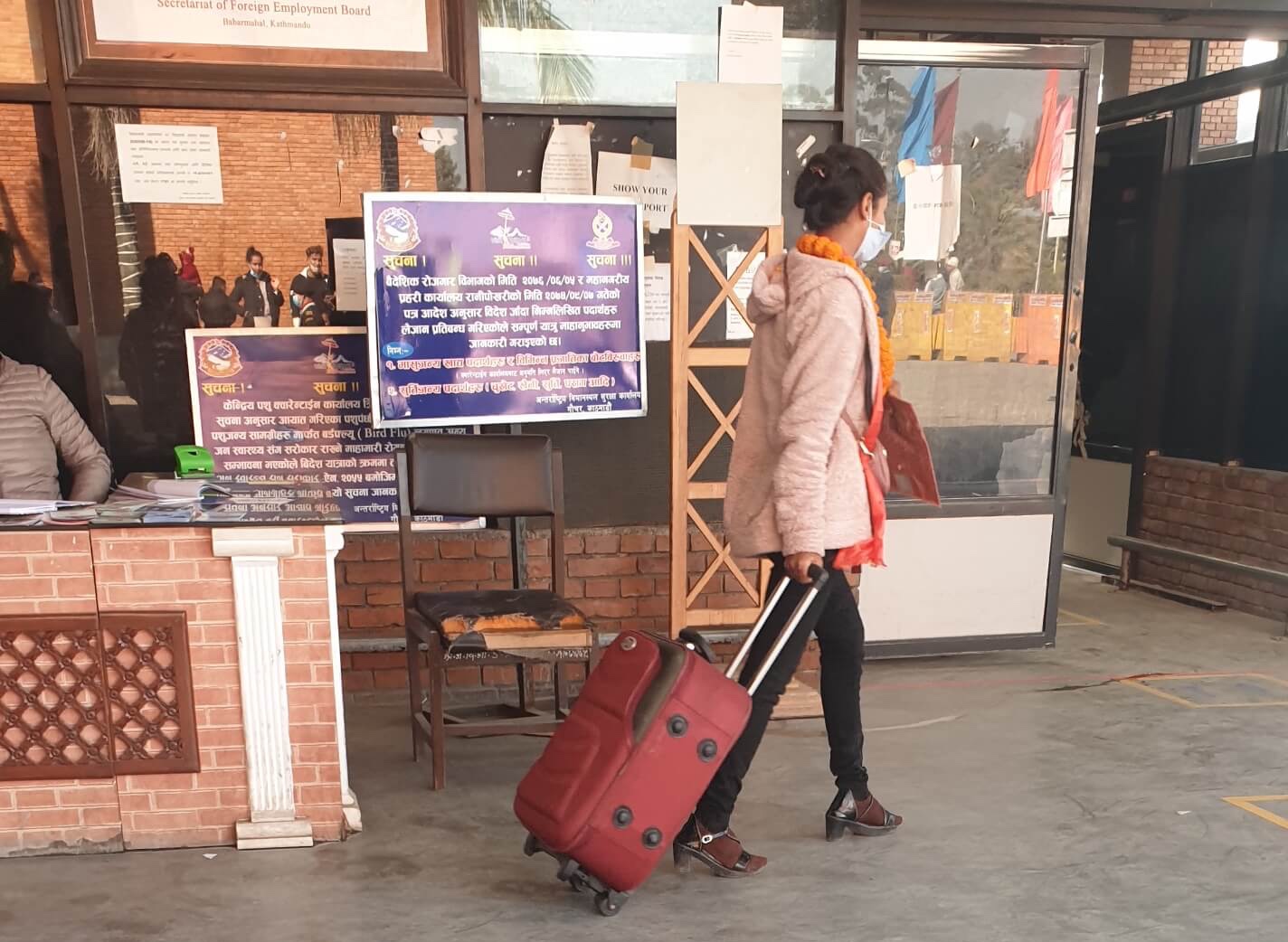Nepal town to ban mothers migrating

Nepal has experimented with different kinds of restrictions on the mobility of its women migrant workers: age bans, blanket bans, country specific bans, sectoral bans. But Chitwan’s Ratnanagar has gone a step further to restrict women with children under two years to travel abroad for foreign employment.
The ban will go into effect from 15 August, and is a departure from previous restrictions on women workers going overseas because it is not at the instruction of a parliamentary committee in Kathmandu, but by a local government.
The rule will apply to all mothers with babies under two years regardless of what kind of work they will be doing abroad. While some previous bans have used the age of women for travel bans, this is the first time a rule uses the age of children as a criteria.
And while previous bans usually cited women’s safety as the main rationale, the new restriction claims to be protecting the rights of children.
“Children are deprived of maternal care when mothers migrate for work, this decision was to ensure that babies are not deprived of their mother’s care including breastfeeding by leaving them with parents or parents-in-law,” says Shishir Poudel, an official at Ratnanagar Municipality. The first few years after birth are formative and have a lasting impact on a person’s growth."
Nepal is not the first country to experiment with such policies. A similar rule in Sri Lanka for a Family Background Report (FBR)was introduced in 2013 and restricts labour migration of females with children below the age of five, while mothers with older children need to prove that they have sufficient care arrangements. Sri Lanka also has restrictions on the age of women going abroad to work.
“The rule demonstrates a patriarchal way of thinking, with women being relegated just within their homes with no power to make decisions regarding livelihoods for themselves or their families,” says Andrew Samuel of the Community Development Services (CDS) in Colombo.
The criticism about FBR in Sri Lanka parallels restrictions on women workers in Nepal over the years. Like Nepal, the FBR was introduced based on anecdotes rather than empirical research and without consulting those involved.
The restrictions in both Nepal and Sri Lanka have also been criticised because they violate a woman’s right to employment and freedom of mobility, and also because similar rules do not apply to men and relinquishes fathers from parental responsibilities.
Many women also choose to migrate either because they have no alternate sources of income or because they are victims of abuse and exploitation at home. Restricting women from finding work abroad could also spur internal migration for work in which case a child would be left behind regardless.
The bans also do not take into account that the absence of income due to the mother being compelled to remain at home may have an even more negative impact on the wellbeing of her children.
“Women going for higher paying jobs manage to bypass FBR whereas domestic workers are subject to restrictions and are impacted negatively,” explains Andrew Samuels of CDS. “With the imposition of FBR, we have seen an uptake of visit visas so women can travel overseas for work without a family background report.”
At the Institute of Policy Studies of Sri Lanka, Bilesha Weeraratne has found that FBR disproportionately impacts those in the lower rungs of skills. She says, “Initially when the restriction only applied to domestic workers, there was a drop in their departure, and an increase in mid-level and professional workers leaving. This indicates people were mis-reporting occupations to bypass FBR restrictions.”
But even after the FBR was later expanded to all sectors in 2015, Weeraartne found that there was an increase in departure of women in the higher skilled groups, showing that the policy was more stringent towards lower skilled groups and lax towards the higher skilled ones.
Recruiters also preferred to diversify towards the higher occupational categories where the FBR was implemented more loosely, she adds. Lower-skilled workers are more vulnerable to recruitment-related corruption, higher vulnerability and lower foreign employment opportunities.
Experts warn that Nepal could also face similar outcomes if the ban on women with babies goes into force. And there has been mixed reaction on social media to the Ratnanagar announcement. Some who favour restrictions on mothers of young children have said the local government should then ensure jobs at home so the poorest can provide for their children.
‘Will the Municipality be responsible for my household expenses as a single mother? The government is oblivious to my requests for support but also wants to stop me from travelling,” reads one post. ‘If you can, also provide children of single mothers with free education and healthcare. If not, allow those of us who want work to do so.’
Another points out: ‘Imagine the circumstances that force a mother to leave behind her baby to work overseas. It is not enough to ban them, the government needs to provide alternatives.”


Devolution under Nepal’s federal constitution had brought hopes for better management of migration given the proximity of local elected officials to those who want to leave and their families. The Local Governance Operation Act gives local governments responsibility for returnee management, data collection and information dissemination. Instead, they seem to be using their power to increase state control over women’s mobility.
Shishir Poudel denies that the Municipality has no jurisdiction over migration policy, adding that migrants already need various documents from his office during the migration process, and the new rule would be feasible to enforce.
There are also practical consequences to implementing local restrictions when they go against national policies and regulations. The Department of Foreign Employment, for example, restricts labour approvals for domestic workers, but not for women with children under two that is specific to any of Nepal’s 753 municipalities. Such policy incoherence leaves room for corruption among recruiters and other officials.
To be sure, the social costs of migration on families left behind, especially young children and ageing parents does need more attention. But instead of bans, struggling families need more support, alternate employment opportunities within Nepal, and the role of spouses of female migrants in childcare responsibilities needs to be re-evaluated.

writer




